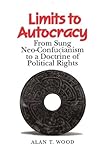Limits to Autocracy : From Sung Neo-Confucianism to a Doctrine of Political Rights / Alan T. Wood.
Material type: TextPublisher: Honolulu : University of Hawaii Press, [1995]Copyright date: ©1995Description: 1 online resource (272 p.)Content type:
TextPublisher: Honolulu : University of Hawaii Press, [1995]Copyright date: ©1995Description: 1 online resource (272 p.)Content type: - 9780824863364
- 320/.0951 20
- JA84.C6 W66 1995eb
- online - DeGruyter
| Item type | Current library | Call number | URL | Status | Notes | Barcode | |
|---|---|---|---|---|---|---|---|
 eBook
eBook
|
Biblioteca "Angelicum" Pont. Univ. S.Tommaso d'Aquino Nuvola online | online - DeGruyter (Browse shelf(Opens below)) | Online access | Not for loan (Accesso limitato) | Accesso per gli utenti autorizzati / Access for authorized users | (dgr)9780824863364 |
Frontmatter -- Contents -- Preface -- Acknowledgments -- 1. Introduction -- Part One. The Historical Dimension -- 2. The Background of Neo-Confucianism -- 3. Background of the Ch’un-ch’iu Commentaries -- Part Two. The Ideological Dimension -- 4. Sun Fu’s Views on Obedience to Authority: The Literal/Moral Levels -- 5. The Views of Ch’eng I and Hu An-kuo: The Moral/Metaphysical Levels -- 6. Statecraft and Natural Law in the West and China -- 7. Implications for Modern China and Japan -- Abbreviations -- Notes -- Selected Bibliography -- Index
restricted access online access with authorization star
http://purl.org/coar/access_right/c_16ec
Alan T. Wood examines the cultural identity of modern China in the context of authoritarianism in the Chinese political tradition. Taking on issues of key importance in the understanding of Chinese history, Wood leads readers to a reconsideration of neo-Confucian thinkers of the Northern Sung dynasty. Modern scholars have accused Sung neo-Confucians of advocating a doctrine of unconditional obedience to the ruler--of "revering the emperor and expelling the barbarian"--and thereby inhibiting the rise of democracy in China. Wood refutes this dominant view by arguing that Sung neo-Confucians intended to limit the power of the emperor, not enhance it. Sung political thinkers believed passionately in the existence of a moral cosmos governed by universal laws that transcended the ruler and could be invoked to set limits on his power. Wood makes a striking comparison of this view with a similar one of universal morality or natural law that developed in late Medieval Europe. By drawing attention to a much-neglected Confucian text, he contributes significantly to the wider dialog of human rights in China and brings forth fresh philosophical insights in his comparative view of Chinese and Western history.
Mode of access: Internet via World Wide Web.
In English.
Description based on online resource; title from PDF title page (publisher's Web site, viewed 02. Mrz 2022)


